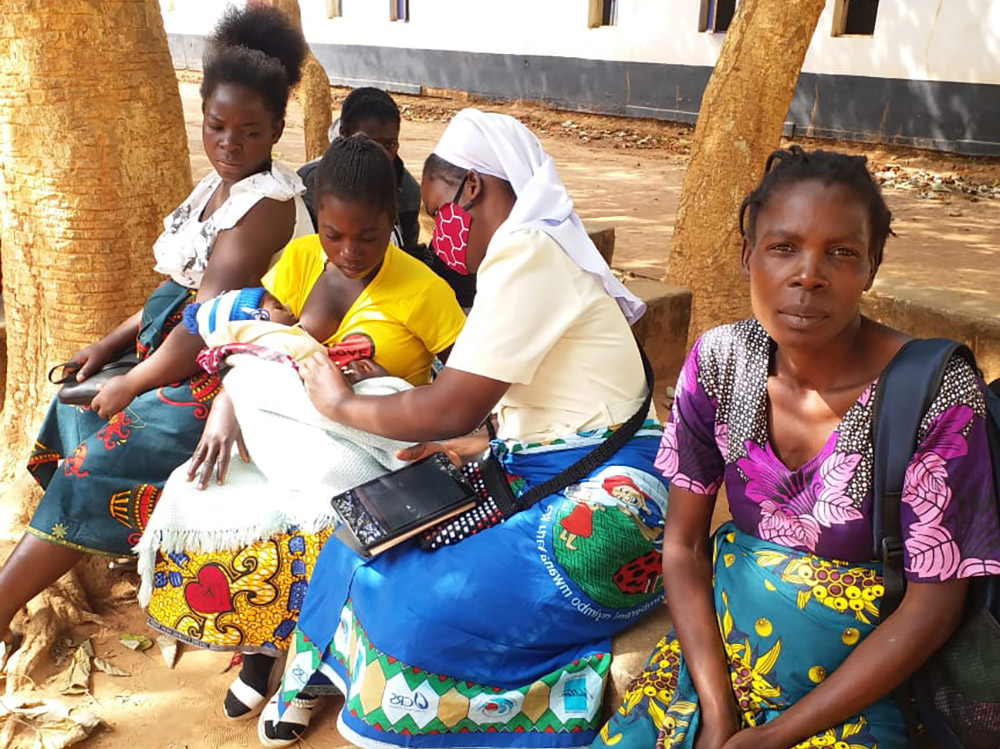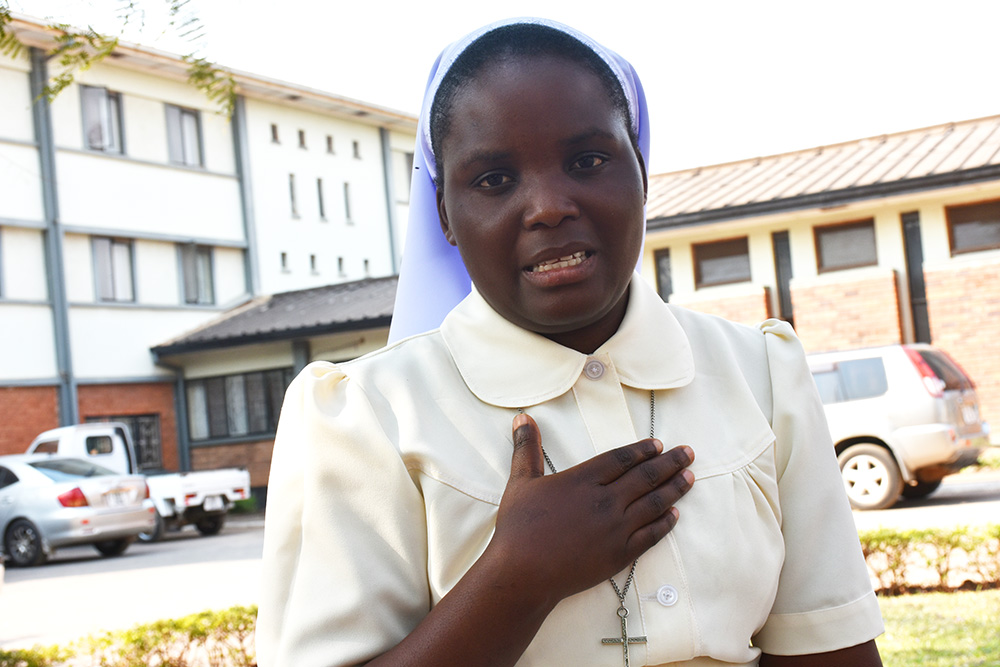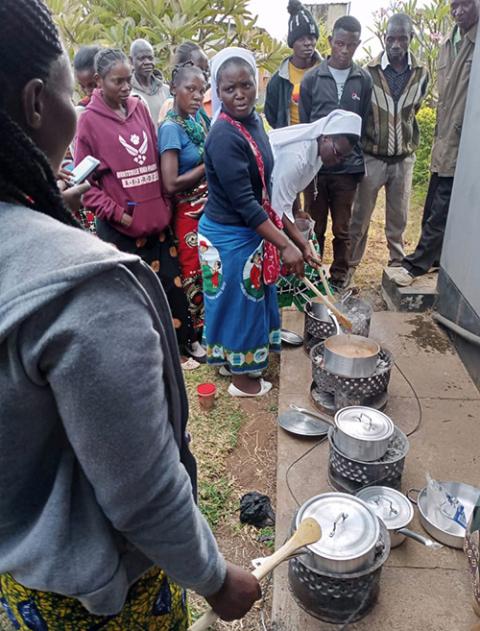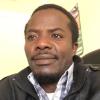
Mercy Sr. Christabel Kazembe interacts with mothers and their children during one of her community outreach programs with Strengthening the Capacity of Religious Women in Early Childhood Development (SCORE-ECD) in Zambia. (Courtesy of Christabel Kazembe)
When Anabel Mwamba gave birth to her first child in 2005, she lacked parenting skills to assess developmental milestones and determine how her baby's life would unfold.
The 36-year-old single mother of four knows how tough it is to feed and take good care of a baby amid socioeconomic hardships.
"As a teen mother, it's not easy to provide adequate nutrition and care for a child. When I had my first child at the age of 18, life was unbearable, especially after my boyfriend deserted me for another woman," Mwamba told Global Sisters Report.
Zambia, like many developing countries, still grapples with teen pregnancies. Many girls, particularly from lower-income environments, become mothers at a young age and, in the process, often deny their babies a dignified life.
Nearly 30% of adolescent girls in Zambia become pregnant by the age of 18, according to the 2018 Zambia Demographic Health Survey. This high rate of teenage pregnancy remains a significant concern and reduces the opportunities for the women to actualize their full potential and entangles them in a perpetual circle of ignorance, poverty and inequality.
Thanks to St. Dominic's Mission Hospital, then called Kavu Rural Health Centre, Mwamba has learned parenting skills that have helped her raise her two youngest children, with some positive effects for the two older children as well. With her third child, born in 2015, she learned the importance of giving birth in a health care facility.
The hospital, which was upgraded into a standard hospital from a clinic, was founded by the Dominican Missionary Sisters of the Sacred Heart of Jesus in 1993 in response to the community need for quality and holistic health care.
Mwamba's rural community lacks adequate healthcare facilities, but she also learned the importance of taking her children to "under-5" clinics for children younger than 5 years old.
Mwamba received assistance through the Integrated Mother and Babies Course initiative, one of the early childhood development projects courtesy of a Conrad N. Hilton Foundation-sponsored program known as "Strengthening the Capacity of Religious Women in Early Childhood Development" (SCORE-ECD). (The Foundation also funds Global Sisters Report.) The project is coordinated by Catholic Relief Services (CRS) and is being implemented in Malawi, Zambia, Kenya and Ghana.

Sr. Christabel Kazembe, a Sister of Mercy in the Diocese of Mansa, Zambia, stresses a point during an interview at the Zambia Association of Sisters offices in Lusaka. She is the project manager for Strengthening the Capacity of Religious Women in Early Childhood Development (SCORE-ECD) in Zambia, which runs early childhood development programs, including teaching parenting skills to mothers. (GSR photo/Derrick Silimina)
In Zambia, as part of a holistic approach to early child development, SCORE-ECD project manager Sr. Christabel Kazembe says her scope of work involves managing community health volunteers and "lead mothers," under the supervision of nurses or sister master-trainers, to execute the program. Through group sessions and home visits, more than 1,600 mothers from the Copperbelt, Central, Luapula and Eastern provinces have benefited from the early childhood development sessions.
"My fieldwork involves doing some complementary activities, such as cooking and teaching the mothers different methods of food preparations using local available foods, encouraging mothers to deliver from the hospital, taking children to under-5 clinics, early stimulation (making toys for the baby using local available materials such as bottles and rags), and maintaining the surroundings clean, among others," she said.
The sisters' workshops cover nutrition, early childhood development, identifying depressive behaviors, mood regulation, maternal mental health integration, and strengthening of couple relationships, among other topics.
Kazembe, who belongs to the Sisters of Mercy in the Mansa Diocese, said, "We desire to live as spiritual sisters of our fellow believers, through radiating the compassionate heart of Christ."
She emphasized that her congregation, which now has 65 sisters, was founded in 1977 to assist in the Mansa Diocese (in the Luapula province in northern Zambia) with pastoral work, Catholic schools and Catholic mission hospitals.

Mercy Sr. Christabel Kazembe teaches caregivers how to prepare local dishes during a nutrition session. (Courtesy of Christabel Kazembe)
"In addition to these, we are also engaged in developmental works of uplifting the standard of living of people in the diocese through agriculture and social work, thereby carrying out integral evangelization of needy people," she said.
Teaching mothers how to care for their children and ensuring they have adequate nutrition is an important part of the congregation's mission.
Psychologically, while no two children develop on the exact same timeline, there are time periods in which major developmental milestones are reached that can determine how a child's life unfolds.
According to a 2004 study published in Paediatrics & Child Health, pregnant women and new mothers in developing countries are affected by depression and other mental health disorders, which can adversely affect breastfeeding, mother-child bonding, parenting quality and the child's overall development.
"I have really benefited a lot from this [SCORE-ECD] program, such that my kids are now growing up healthy," Mwamba said, calling the program "informative and helpful."
For Exhilda Musonda, a mother of five from Ndola who has also benefited from the project, "before our parish sisters and lead mothers taught me how to prepare local nutritious foods and the importance of maternal health care, my kids' health was bad," she said. "But thanks to their timely help, I am now able to provide adequate care and nutritious food to my children thanks to the Integrated Mother/Baby Course that I was privileged to undergo."
Advertisement
Anastasia Nkandu, a lead mother who is in charge of more than 10 caregivers in an area of Ndola, stressed that the program is indeed changing lives in her community. "Most mothers here lack knowledge, especially teen caregivers, but after our input with basic livelihood skills, they are now able to take good care of their children and families responsibly, thereby adding value to their well-being."
In a bid to ensure that children under 2 years old thrive in a sustainable culture of care and support, Kazembe further noted that early childhood development is vital to any child's well-being. Most of Kazembe's work includes health and nutrition, education and social protection of young children, but she also focuses on their physical, cognitive, linguistic, social and emotional development.
The project caters to the most vulnerable children ages infant to 5 years old, with a particular focus on children from infancy to 2 years old, some of whom are disabled and/or have HIV/AIDS, Kazembe said. The program across all dioceses of the four provinces is making a difference in Zambia's remote communities, she said.
"Helping people in different ways has really helped me to radiate God's compassion to his people as our congregation mission states," she said. "By reaching out to those people, I feel I am fulfilling my duty as a Sister of Mercy. Therefore, I feel my congregation's mission and my own mission is being fulfilled."





